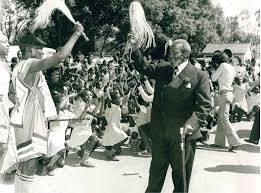×
The Standard e-Paper
Kenya’s Boldest Voice

On an account of his poor grades, missionary teachers at the Thogoto Church of Scotland Mission Station thought Kamau wa Ngengi, who was born in Ng’enda, Gatundu, in the early 1890s, didn't have a future beyond masonry.
He defied them and became the first President of Kenya, a feat his son, Uhuru, would repeat five decades later.